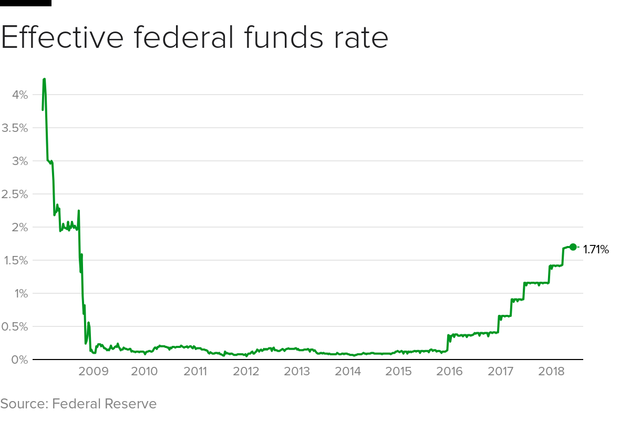Last Updated Jun 13, 2018 2:27 PM EDT
The Federal Reserve raised a key interest rate another quarter-point on Wednesday. The federal funds target rate, which is now between 1.75 and 2 percent, is the highest it's been in nearly a decade, indicating that the nation's central bank has confidence the economy will continue to expand.
"Job gains have been strong, on average, in recent months, and the unemployment rate has declined," the Fed said in its latest policy statement. "Recent data suggest that growth of household spending has picked up, while business fixed investment has continued to grow strongly."

The central bank said it expects two more rate hikes this year, indicating an increasingly positive view of the economic expansion. That's good news because it means the economy is largely moving on its own steam in the eyes of the Fed. After keeping interest rates low for years to boost growth, the central bank is now moving rates back to what economists say is a neutral position. One problem: There's little agreement on what a neutral number is.
Consumers can expect interest rates to rise for all types of debt. The most immediately affected will be credit-card interest rates, which are subject to near-instantaneous revision to track the federal funds rate. Rates for car loans and variable-rate mortgages are also likely to increase.
Rates for conventional mortgages are likely to see more gradual change. The average rate for a 30-year fixed mortgage hit a high of 4.8 percent in the last week of may before dropping slightly.
Rates for savers have tended to lag the Fed's hikes. The top interest rate currently on offer for a savings account is just 2.05 percent, according to Bankrate, with the average rate only 0.06 percent.
So-called core inflation -- which excludes volatile items like energy and housing -- is now 2.2 percent, around the level the Fed is looking for. Government data show that hourly earnings are rising at an annualized rate of 2.8 percent, and even a touch more for lower-income workers. Paychecks aren't soaring, in other words, but at least most Americans are staying ahead of inflation.